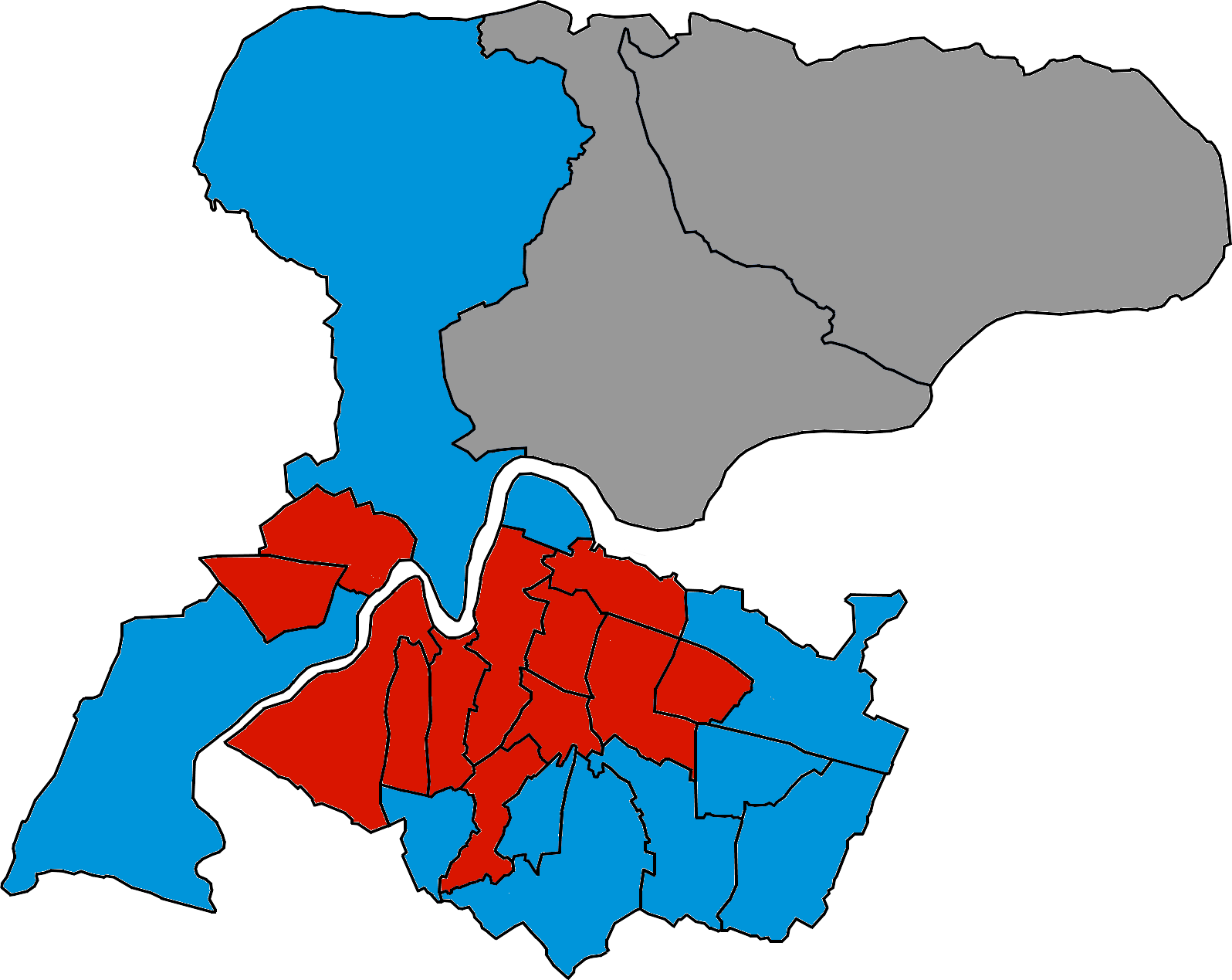Medway Council
Medway council was formed on 1 April 1998 with the merger of Gillingham borough council and Rochester-upon-Medway city council. The authority consists of 59 councillors.
Medway's councillors are elected to represent the district's 24 wards every four years. They have responsibility for local matters including housing, local business, planning and schools.
Medway Councillors

Colour denotes the highest-polling candidate in the most recent election in each ward. If there are councillors from another party in the same ward, they are denoted by a star.
Medway council is currently comprised of 59 councillors, with 58 councillors belonging to one of four political groups and one independent councillor.
Between the first elections to Medway council in 1997 and 2003, there were 80 seats on the council across 35 wards. After the boundaries were redrawn in 2003, there were 55 seats across 22 wards.
Since May 2023, there have been 59 seats across 24 council wards.
Political Groups
Candidates usually stand for a political party (although some stand as independent candidates) and, if elected, sit in that party's political group. A party requires two or more members to formally constitute a group.
Medway council is currently made up of the following political groups:
| Labour and Co-operative group | 31 | |
| Conservative group | 20 | |
| Independent group | 5 | |
| Reform UK group | 2 | |
| Independent | 1 |
Former Political Groups
The following parties have also been represented on the council since the first elections in 1997:
| Independent Conservative | |
| Independent Liberal Democrat | |
| Liberal Democrat | |
| Ukip |
Political Control
A political group currently requires 30 members for an overall majority on the council. If no group has more than 30 members then the administration is classed as "NOC", or no overall control.
Between 2003 and 2023, a political group required 28 members for an overall majority, while prior to 2003, a political group required 41 members for an overall majority.
The 2003 election was the first time a single political group had an overall majority on the council.
| Control of the Council | From | To | |
| No overall control | April 1998 | May 2003 | |
| Conservative | May 2003 | May 2023 | |
| Labour and Co-operative | May 2023 | Feb 2025 | |
| No overall control | Feb 2025 | Apr 2025 | |
| Labour and Co-operative | Apr 2025 | Present |
Leader of the Council
In 2001, Medway council adopted the cabinet and portfolio holder model of governance. Under this model, the full council elects a leader, typically the leader of the largest party on the council, who then appoints portfolio holders to act as the council's executive.
Prior to 2001, Medway council operated under the committee model of governance. There was no formal executive, with decisions taken by committees. The chair of the policy committee was typically the leader of the council.
Since 1998, the leaders of Medway council have been:
| Leader | From | To | |
| John Shaw | Apr 1998 | May 1999 | |
| Paul Godwin | May 1999 | May 2000 | |
| Rodney Chambers OBE | May 2000 | May 2015 | |
| Alan Jarrett | May 2015 | May 2023 | |
| Cllr Vince Maple | May 2023 | Present |
Cabinet and Committees
In addition to periodic meetings of the full council, councillors may sit on specialist committees which have delegated authority to take decisions or hold the council's executive branch, the cabinet, to account.
Council
Medway's councillors meet together six times a year to discuss the council's policy framework and budget. Certain other decisions are also reserved for the council such as making changes to Medway’s constitution, determining electoral issues and dealing with matters which are not the responsibility of the cabinet.
| Council |
Cabinet
The cabinet is the council's executive branch, responsible for proposing the policy framework and budget to the rest of the council and for taking decisions on resources and priorities throughout the year. The cabinet delivers and implements the budget and policies decided by the council.
| Cabinet |
From time to time, the cabinet may also establish advisory groups to advise on specific areas of council policy. The current advisory groups are:
Overview and Scrutiny Committees
Overview and scrutiny is one of the most important ways in which councillors can influence council policy and champion their constituents. Councillors can ask the committees to discuss issues of local importance by asking for a members item to be added to the agenda or through the facility to raise a councillor call for action.
The committees also debate petitions presented to council where the petitioners are not satisfied with the response they have had play a key role in developing and reviewing policy and holding the cabinet to account.
| Business Support and Digital Overview and Scrutiny Committee |
| Children and Young People Overview and Scrutiny Committee |
| Health and Adult Social Care Overview and Scrutiny Committee |
| Kent and Medway NHS Joint Overview and Scrutiny Committee |
| Regeneration, Culture and Environment Overview and Scrutiny Committee |
Regulatory and Councillor Conduct Committees
These committees deal with the functions of the council that cannot be dealt with by the cabinet, for example, determination of applications for planning permission. There are also committees that must be set up under specific legislation such as the licensing committee.
| Appointments Committee |
| Audit Committee |
| Councillor Conduct Committee |
| Disciplinary Appeals Committee |
| Employment Matters Appeals Panel |
| Employment Matters Committee |
| Health and Wellbeing Board |
| Kent and Medway Police and Crime Panel |
| Licensing and Safety Committee |
| Licensing Hearing Panel |
| Licensing Sub-Committee |
| Planning Committee |
| School Transport and Curriculum Appeals Committee |
| South Thames Gateway Building Control Joint Committee |
Click on the name of any committee to see a brief description of their role, their current members and councillors' attendance record.
Councillors' Allowances
All councillors are entitled to a basic allowance and to claim for certain travel and subsistence expenses. Some councillors have special responsibilities (e.g. a cabinet portfolio or chairing a committee) and receive an additional allowance. The amount paid each year for these was:
| 2023/2024 | £1,021,303.98 | |
| Basic allowance | £671,601.50 | |
| Special responsibility allowance | £347,974.35 | |
| Travel and subsistence | £1,728.13 | |
| Dependent carers allowance | £1,335.00 |
| 2021/2022 | £901,731.00 | |
| Basic allowance | £584,994.00 | |
| Special responsibility allowance | £315,705.00 | |
| Travel and subsistence | £1,032.00 | |
| Dependent carers allowance | £45.00 |
| 2019/2020 | £873,946.00 | |
| Basic allowance | £564,248.00 | |
| Special responsibility allowance | £304,884.00 | |
| Travel and subsistence | £4,814.00 | |
| Dependent carers allowance | £80.00 |
| 2017/2018 | £743,473.00 | |
| Basic allowance | £471,667.00 | |
| Special responsibility allowance | £268,118.00 | |
| Travel and subsistence | £3,688.00 |
| 2015/2016 | £729,116.00 | |
| Basic allowance | £466,711.00 | |
| Special responsibility allowance | £258,297.00 | |
| Travel and subsistence | £4,108.00 |
| 2013/2014 | £734,772.04 | |
| Basic allowance | £471,465.36 | |
| Special responsibility allowance | £257,258.10 | |
| Travel and subsistence | £6,048.58 |
| 2011/2012 | £758,390.22 | |
| Basic allowance | £486,438.85 | |
| Special responsibility allowance | £266,295.69 | |
| Travel and subsistence | £5,655.68 |
| 2009/2010 | £759,820.62 | |
| Basic allowance | £495,145.60 | |
| Special responsibility allowance | £256,066.71 | |
| Travel and subsistence | £8,608.31 |
| 2007/2008 | £739,075.04 | |
| Basic allowance | £479,756.46 | |
| Special responsibility allowance | £248,461.16 | |
| Travel and subsistence | £10,857.42 |
| 2005/2006 | £695,820.71 | |
| Basic allowance | £453,387.00 | |
| Special responsibility allowance | £230,025.50 | |
| Travel and subsistence | £12,408.21 |
| Total | £14,965,555.70 | |
| Basic allowance | £9,658,287.27 | |
| Special responsibility allowance | £5,197,355.47 | |
| Travel and subsistence | £108,347.96 | |
| Dependent carers allowance | £1,565.00 |
Allowances information is only available from 2005 onwards. Click on a year to see a breakdown of the allowances each councillor received.
Councillors' Attendance
In addition to cabinet and committee meetings, the full council meets six times a year and, unless there are extenuating circumstances, all councillors are expected to attend these meetings. The attendances recorded in each council term is as follows:
Council and committee attendance records are only available from October 2001 onwards. Cabinet attendance records are only available from March 2010 onwards. The earliest committee meeting we have attendance data for is that held on 21 November 2007.
Councillors' Voting Record
Most decisions taken by councillors at meetings of the full council are made by unanimous agreement or, if the decision is disputed, by show of hands. However, the council's constitution states that in certain circumstances, or if six or more members request, a "recorded vote" may be taken, where each councillor's vote is recorded in the minutes of the meeting. The number of votes recorded in each council term is as follows:
Recorded votes are only available from December 2001 onwards. Click on a council term to see the full list of recorded votes, whether they were carried or lost and how each councillor voted.
Medway Council Wards
Medway is divided into 24 electoral areas known as "wards". Of those wards, 14 elect three councillors and seven elect two councillors. Theses wards are often known as "multi-member wards". In addition, three wards elect one councillor, and are often known as "single-member wards".
From its formation as a shadow authority in 1997 until 2003, Medway was divided into 35 multi-member wards. Of those, 10 elected three councillors and 25 elected two councillors. Between 2003 and 2023, Medway was divided into 22 multi-member wards. Of those, 12 elected three councillors, nine elected two councillors and one elected one councillor.
The following wards are currently represented on Medway council:
| Fort Pitt | |
|
Cllr Smitha Campbell Labour and Co-operative |
|
|
Cllr Harinder Mahil Labour and Co-operative |
|
|
Cllr Gareth Myton Labour and Co-operative |
| Gillingham South | |
|
Cllr Dan McDonald Labour and Co-operative |
|
|
Cllr Liubov Nestorova Labour and Co-operative |
|
|
Cllr Louwella Prenter Labour and Co-operative |
| Hoo St Werburgh & High Halstow | |
|
Cllr George Crozer Independent |
|
|
Cllr Michael Pearce Independent |
|
|
Cllr Ron Sands Independent |
| Rainham North | |
|
Cllr Kwashie Anang Conservative |
|
|
Cllr George Perfect Conservative |
|
|
Cllr Wayne Spring Conservative |
| Rochester West & Borstal | |
|
Cllr Linda Bowen Labour and Co-operative |
|
|
Cllr Paula Hamilton Labour and Co-operative |
|
|
Cllr Alex Paterson Labour and Co-operative |
| Strood North & Frindsbury | |
|
Cllr David Field Labour and Co-operative |
|
|
Cllr Stephen Hubbard Labour and Co-operative |
|
|
Cllr Zoë Van Dyke Labour and Co-operative |
| Strood West | |
|
Cllr Sharon Jackson Labour and Co-operative |
|
|
Cllr Mark Jones Labour and Co-operative |
|
|
Cllr Satinder Shokar Labour and Co-operative |
| Watling | |
|
Cllr Tracy Coombs Labour and Co-operative |
|
|
Cllr Marian Nestorov Labour and Co-operative |
|
|
Cllr Chrissy Stamp Labour and Co-operative |
Click on the name of a ward above to see councillor history and election results. To see historical information for old wards, please go here.
Elections
The first elections to Medway council took place on 1 May 1997. Those elections established a "shadow authority" until Medway council was formed on 1 April 1998. Subsequent elections were held on 4 May 2000 and 1 May 2003, since when elections have been held every four years on the first Thursday in May.
There have also been various by-elections to Medway council seats since 1997, following the death or resignation of a sitting councillor. However, if a councillor dies or resigns within six months of a scheduled full election, then a by-election is not held and their seat instead remains vacant until the next full election.
The following elections to Medway council have taken place since it was formed:
|
Rochester East & Warren Wood by-election 6 February 2025 |
||||
| Reform UK gain from Labour and Co-operative | ||||
| Reform UK gain from Labour and Co-operative | ||||
|
Council election 4 May 2000 |
||
| Conservative | 38 | |
| Labour | 25 | |
| Liberal Democrats | 15 | |
| Independent Liberal Democrat | 2 | |
To view the results for each election, click on the election date above.

